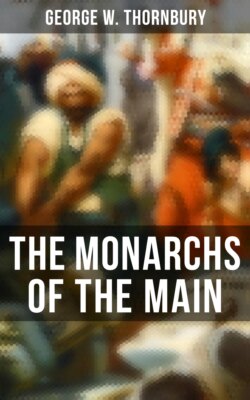Читать книгу The Monarchs of the Main - George W. Thornbury - Страница 9
На сайте Литреса книга снята с продажи.
ОглавлениеThe following anecdote shows what strange modifications of crime this species of slavery might occasionally produce. There was a rich inhabitant of Guadaloupe, whose father became so poor that he was obliged to sell himself as an engagé, and by a singular coincidence sold himself to a merchant who happened to be his son's agent. The poor fellow, finding himself his son's servant, thought himself well off, but soon found that he was treated as brutally as the rest. The son, finding the father was old and discontented, and therefore unable to do much work, and afraid to beat him for the sake of the scandal, sold him soon after to another planter, who treated him better, gave him more to eat, and eventually restored him to liberty. Of the ten thousand Scotch and Irish whom Cromwell sent to the West Indies, many became engagés, and finally Buccaneers. Many of the old Puritan soldiers, who had served in the same wars, were enrolled in the same ranks.
The same principle of brotherhood applied to the planters as to the ordinary Buccaneers. They called each other matelots, and, before living together, signed a contract by which they agreed to share everything in common. Each had the power to dispose of his companion's money and goods, and an agreement signed by one bound the other also. If the one died, the survivor became the inheritor of the whole, in preference even to heirs who might come from Europe to claim the share or attempt to set up a claim. The engagement could be broken up whenever either wished it, and was often cancelled in a moment of petulance or of transitory vexation. A third person was sometimes admitted into the brotherhood on the same conditions. By this singular custom, friendships were formed as firm as those between a Highlander and his foster-brother, a Canadian trapper and his comerade, or an English sailor and his messmate.
The matelotage, or compagnon à bon lot, being thus formed, the two planters would go to the governor of the island and request a grant of land. The officer of the district was then sent to measure out what they required, of a specified size in a specified spot. The usual grant was a plot, two hundred feet wide and thirty feet long, as near as possible to the sea-shore, as being most convenient for the transport of goods, as well as for the ease of procuring salt water, which they used in preparing the tobacco leaf. When the sea-shore was covered with cabins the planters built their huts higher up and four deep, those nearest to the beach being obliged to allow a roadway to those who were the furthest back. Their lodges, or ajoupas, were raised upon ground cleared from wood, the thicket being first burnt with the lower branches of the larger trees. The trunks, too large to remove, were cut down to within two or three feet of the earth, and allowed to dry and rot for several summers, and finally also consumed by fire. The savages, on the other hand, cut down all the trees, let them dry as they fell, and then, setting the whole alight, reduced it at once to ashes, without any clearing, lopping, or piling. When about thirty or forty feet of ground was thus cleared, they began to plant vegetables and cultivate the ground—peas, potatoes, manioc, banana, and figs being the daily necessaries of their lives. The banana they planted near rivers, no planter residing in a place where there was not some well or spring. Their casa, or chief lodge, was supported by posts fifteen or sixteen feet high, thatched with palm branches, rushes, or sugar-canes, and walled either with reeds or palisades. Inside, they had barbecues, or forms rising two or three feet from the ground, upon which lay their mattresses stuffed with banana leaves, and above it the mosquito net of thin white linen, which they called a pavillon. A smaller lodge served for cooking or for warehousing. Friends and neighbours always assisted in building these cabins, and were treated in return with brandy by the planter. The laws of the society obliged the settlers to help each other, and this kindness was never refused. The same system of mutual support originated the Scotch penny weddings and the English friendly custom of ploughing a young farmer's fields.
Now the ajoupa was built, the tobacco ground had to be dug. An enclosure of two thousand plants required much care, and was obliged to be kept clean and free from weeds. They had to be lopped, and transplanted, and irrigated, and finally picked and stored. The people of Tortuga, the Buccaneers' island, exchanged their tobacco with the French merchants for hatchets, hoes, knives, sacking, and above all for wine and brandy.
From potatoes, which the planters ate for breakfast, they extracted maize, a sour but pleasant beverage. The cassava root they grated for cakes, making a liquor called veycon of the residue. From the banana they also extracted an intoxicating drink.
With the wild boar hunters they exchanged tobacco leaf for dried meat, often paying away at one time two or three hundred weight of tobacco, and frequently sending a servant of their own to the savannahs to help the hunter and to supply him with powder and shot.
